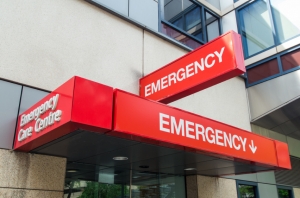 When you experience a medical emergency, like breaking a bone or suffering a traumatic brain injury in car accident, your first thought might be to seek out the ER at your local hospital. A company based in Texas, however, is attempting to change that system by launching its chain of freestanding emergency rooms throughout the nation. Adeptus Health owns First Choice, which owns 63 ERs throughout Texas, Arizona and Colorado; the chains in Texas operate without any other hospital affiliation.
When you experience a medical emergency, like breaking a bone or suffering a traumatic brain injury in car accident, your first thought might be to seek out the ER at your local hospital. A company based in Texas, however, is attempting to change that system by launching its chain of freestanding emergency rooms throughout the nation. Adeptus Health owns First Choice, which owns 63 ERs throughout Texas, Arizona and Colorado; the chains in Texas operate without any other hospital affiliation.
A freestanding ER poses no problem so long as things are going smoothly. But if an act of medical malpractice occurs in the facility, there could be some confusion about who, precisely, is responsible. If an EMT chooses to bring a patient to a non-affiliated ER chain, and then that patient dies, is the EMT service also accountable?
Putting profits before patients
An article in Modern Healthcare points out that freestanding emergency rooms have been approved in other parts of the country, and that the owners of Adeptus Health have already started lobbying in Washington, D.C. for the right to expand. They claim to offer the same services as a traditional E.R., and can help communities which cannot support a full hospital. But “critics say free-standing ER operators’ business strategy is to cherry-pick privately insured patients in more affluent suburban and exurban communities who want care access closer to their homes, while steering sicker and lower-income patients to traditional hospital emergency departments.” For proof, one need only look at Georgia, where the laws were changed in 2014 to accommodate the ERs but as of yet have not been approached by Adeptus Health – or any other company – about building the facilities in more rural areas without hospitals. Furthermore, First Choice accepts neither Medicare nor Medicaid.
Perhaps the most frightening aspect of the freestanding ER is not where it operates, but how. Lance Lunsford, the vice president of advocacy communications of the Texas Hospital Association, points out that the facilities “do not have to meet the rigorous requirements” that hospitals would have to meet in regards to staff, nor must they “invest heavily in equipment, technology and clinical talent” that hospitals do. If freestanding ERs do not offer the same services, then how can they be believed about providing the same level of care? And if they do not provide the same level of care, then why would anyone use them?
In the end, it may only be possible to ensure the highest levels of emergency care through hospital affiliation – and then, only if the partnership is truly reciprocal. If freestanding ERs wish to operate independently, they may be forced to show they can provide the same quality care as a local D.C. hospital, which means having all the same equipment, regulations and rules our hospitals have now.







Leave A Comment